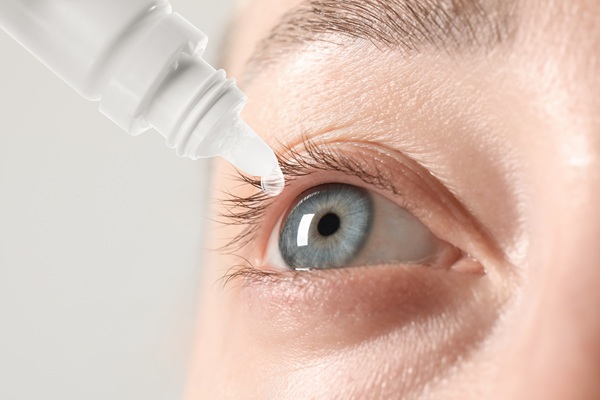When Would an Optometrist Recommend Corrective Lenses?

If you have never had corrective lenses, it is common to think you do not need them. It is, however, also common to find out that you need glasses or contacts later in life-- often after getting an eye exam for the first time in years. Difficulty seeing at night, trouble working on a computer, and frequent headaches are some reasons why people decide to book this exam. Fortunately, there is a solution. An optometrist may recommend corrective lenses to solve these vision problems and others like them.
About corrective lenses
Corrective lenses are clear lenses that change how light enters the eye to improve vision. They may come in the form of eyeglasses or contact lenses. Either way, an optometrist will create a custom prescription for each patient.
With glasses, this prescription is infused into clear lenses. Patients may have these lenses placed in any style of frame (round, square, etc.). Alternatively, there is no need for frames with contact lenses; the optometrist will have the prescription put directly into these transparent lenses that fit over the eye surfaces.
When to consider corrective lenses
According to the Vision Council,197 million people in the U.S. used some form of vision correction in 2021. However, many people do not know that they need glasses or contacts. This is especially true when a patient has had vision problems for years, or even their whole life, but has never had an eye exam. They may think that everyone sees the way they do. Some signs that a patient may have vision problems and should consider corrective lenses include:
- Objects nearby seem blurry
- Objects far away, such as road signs, seem blurry
- Has trouble seeing at night or adjusting to light changes
- Has dry or itchy eyes from eye strain
- Gets headaches or migraines from straining the eyes
- Vision becomes blurred by "halos" around lights
- Eyes become strained easily while reading or on digital devices
Vision problems that lenses can correct
Corrective lenses help with a variety of vision problems. In doing so, they also resolve the symptoms of poor vision listed above. For instance, patients will no longer need to strain their eyes to focus on objects nearby or far away, which relaxes the eye, eases dry eye, and prevents headaches. Essentially, wearing prescription lenses corrects the problem, not just the symptom.
Some of the most common vision problems corrected with lenses are nearsightedness and farsightedness. Nearsightedness, or myopia, is when a patient has trouble seeing objects far away; farsightedness, or hyperopia, is when objects nearby are hard to see. Corrective lenses may also help patients with astigmatism, a condition in which the lens of the eye is abnormally curved, resulting in blurred and wavy vision at any distance.
Choosing a type of corrective lenses
There are two types of corrective lenses: eyeglasses and contact lenses. Both can correct most types of vision problems. However, an optometrist would not recommend contacts to a patient with dry eyes because the eye needs a good amount of natural lubrication. Further, contacts cannot correct severe astigmatism. This aside, whether patients choose glasses or contacts typically boils down to personal preference.
When glasses are recommended
An optometrist may recommend glasses for patients who want a more affordable and convenient solution. With so many frame styles and colors, patients tend to have no problem finding frames that suit them. If they do, an optician can help and advise which frames fit which face shapes.
The maintenance of glasses is simple. Patients only need a microfiber cloth and a gentle, nonabrasive spray to keep them clean. If glasses become loose, the patient can return them to the optometrist's office for an adjustment. As long as their eyesight does not change, glasses can last for a year, two years, or longer.
When contacts may be a better option
Some patients do not like wearing glasses. Sometimes, they get in the way of a patient's job, hobby, or personal style. For these patients, an optometrist may recommend contact lenses. Since they simply fit over the eye, there is no need to worry about them at work or while playing sports. No one will notice them either, so they do not interfere with one's style.
Consult an optometrist
If you have been struggling with the symptoms of poor vision, corrective lenses may help you regain clarity. We provide both glasses and contacts. Call our Dallas office to schedule an appointment with an optometrist.
Request an appointment here: https://www.texasoptical.net or call Texas Optical at (214) 771-7333 for an appointment in our Dallas office.
Check out what others are saying about our services on Yelp: Read our Yelp reviews.
Recent Posts
Dry eye treatment options range from simple artificial tears to sophisticated in-office technologies, and choosing the most effective approach starts with a clear understanding of why the tear film loses stability. An optometrist evaluates tear quantity, lipid balance, and ocular-surface integrity to build a personalized plan that restores comfort and sharp vision. An individualized strategy…
Safety glasses play a critical role in protecting vision across various environments, from construction sites and laboratories to sports fields and home workshops. Selecting the right safety glasses ensures effective eye protection without compromising comfort, visibility, or durability. Whether worn for occupational tasks, athletic activities, or everyday projects, proper safety eyewear helps prevent injuries and…
Glaucoma treatment begins with a detailed evaluation to understand the full health of the eyes. This visit plays a key role in diagnosing glaucoma early and creating a care plan to help prevent vision loss. Knowing what to expect can make the process easier and help patients feel more at ease.Every glaucoma treatment evaluation begins…
Contact lens exams are fundamental to maintaining clear vision and promoting overall eye health. Many individuals rely on contact lenses for daily activities, sports, and social events, yet consistent monitoring of lens fit and eye condition often receives less attention than it deserves. An optometrist specializing in evaluating the cornea, tear film, and general ocular…


